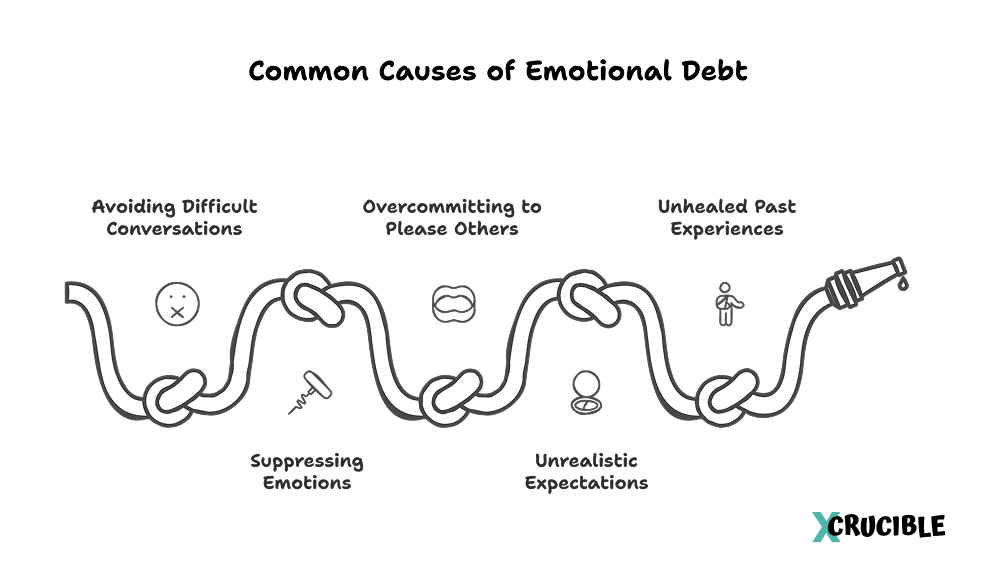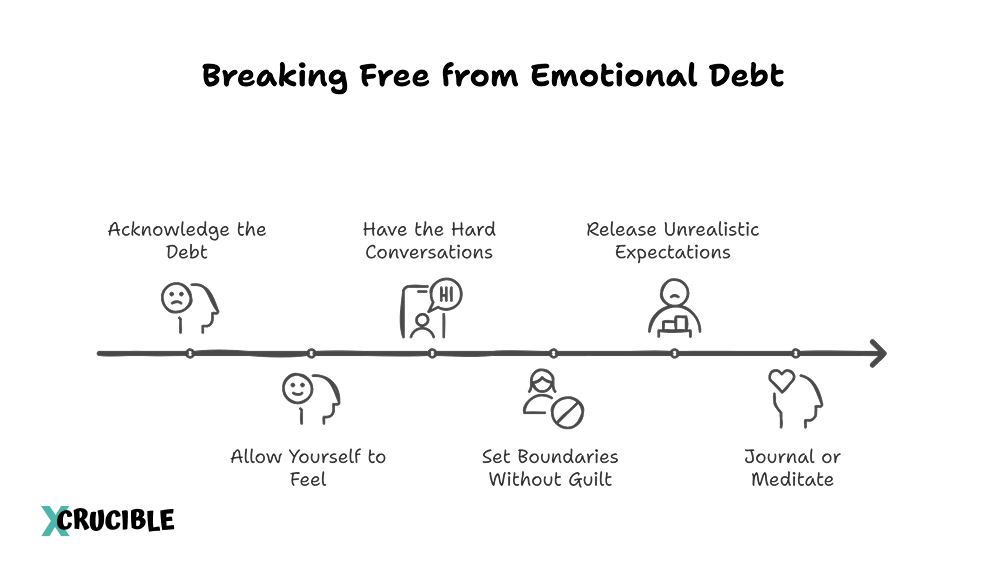Ever felt like you’re carrying a weight you can’t quite put down? You keep pushing through your day, ticking tasks off your list, smiling when you need to—but deep down, something feels heavy.
It’s not just stress from today. It’s pieces of yesterday—unspoken words, feelings you pushed aside, promises you made to yourself but didn’t keep. Over time, these moments pile up, and suddenly, life feels harder than it should.
What if that unseen weight has been holding you back more than you realize? Let’s dig into why it happens—and how you can set yourself free.
What is Emotional Debt?
Emotional debt is the buildup of unresolved feelings like stress, guilt, resentment, or sadness that we keep pushing aside instead of addressing.
Every time you tell yourself, “I’ll deal with this later,” you’re borrowing from your own peace of mind. It starts small, like swallowing anger to avoid an argument or pretending you’re okay when you’re not. But over time, the unpaid emotions pile up.
Imagine ignoring bills for months. The longer you wait, the bigger the balance gets, and eventually, it demands payment. Emotional debt works the same way.
It doesn’t always look dramatic. Sometimes it’s snapping at someone over something small, feeling exhausted even after a full night’s sleep, or losing motivation for things you once enjoyed.
Example:
Imagine you agreed to take on extra work even though you were already overwhelmed. You told yourself, “It’s fine, I’ll manage.” But deep down, resentment started brewing. You didn’t address it, and now you find yourself dreading work, feeling irritated with colleagues, and questioning your abilities. That’s emotional debt.
The Psychology Behind
Emotional debt forms because our brains are designed to prioritize short-term stability over long-term processing. When a negative emotion like anger, guilt, or sadness arises, the amygdala signals discomfort, and the prefrontal cortex often steps in to suppress it for the sake of social harmony or immediate survival. This avoidance response feels like relief in the moment because it prevents conflict or overwhelm, but it doesn’t resolve the underlying emotion.
Instead, those emotions are stored as unfinished processes in the limbic system. Over time, these unresolved feelings increase cognitive load, drain working memory, and heighten stress hormones like cortisol. This makes us more reactive, less resilient, and prone to burnout. In essence, emotional debt is the psychological cost of repeatedly choosing avoidance over expression.
Do You Have Emotional Debt? (Key Signs)
You might not realize you’re carrying emotional debt because it doesn’t show up as one big breakdown. It sneaks in through little patterns, like these:
- You feel drained even after a full night’s sleep.
- Small inconveniences make you snap or lose patience.
- You replay past conversations, wishing you had said something different.
- You avoid certain people or situations because they feel “too heavy.”
- You keep telling yourself, “I’m fine,” when deep down you know you’re not.
- Things that once excited you now feel like a chore.
If several of these sound familiar, chances are you’ve been putting your emotions on the back burner for too long—and the balance is catching up.
How Does It Impact Your Life?
Emotional debt doesn’t stay hidden—it quietly shapes how you feel, think, and act. Here’s how it shows up:
Mental Load Increases
When emotions go unresolved, your brain keeps looping back to them. You find it hard to concentrate, make decisions, or feel mentally clear. It’s like running too many apps on your phone—eventually, it slows down.
Emotional Volatility
You start reacting strongly to small triggers—snapping at a loved one or feeling overwhelmed by minor inconveniences. This happens because suppressed emotions resurface in unexpected ways.
Physical Health Takes a Hit
Chronic stress from emotional debt can lead to headaches, fatigue, muscle tension, and even weakened immunity. Your body pays the price for what your mind avoids.
Strained Relationships
Unspoken resentment or guilt creates distance. You might withdraw, avoid conversations, or feel misunderstood, even by those closest to you.
Loss of Joy and Motivation
Activities that once felt exciting now feel like chores. Emotional debt robs you of mental space to enjoy life because part of you is always carrying the weight of unresolved feelings.
Increased Anxiety and Self-Doubt
The longer emotions remain unprocessed, the more they fuel negative self-talk and anxiety, making you question your decisions and worth.
Common Causes of Emotional Debt
Emotional debt often builds quietly, and most of the time, we don’t realize how it starts. Here are the most common triggers:

Avoiding Difficult Conversations
When we choose silence over expressing what bothers us, resentment piles up. Instead of resolving the issue, we carry the weight of unsaid words.
Suppressing Emotions
Feeling sad, angry, or hurt but telling yourself, “I’ll deal with it later”? Those postponed feelings don’t disappear—they accumulate like unpaid bills.
Overcommitting to Please Others
Saying yes when you want to say no creates a gap between your true feelings and your actions. This gap often leads to guilt and frustration.
Unrealistic Expectations
Expecting perfection—from yourself or others—sets you up for disappointment. When reality doesn’t match expectations, unresolved frustration becomes emotional debt.
Unhealed Past Experiences
Old wounds, like childhood trauma or previous relationship pain, can resurface if never addressed. They become an emotional backlog that influences your present.
Avoiding Self-Reflection
Not checking in with yourself emotionally can lead to a buildup of feelings you didn’t even know existed. Ignoring them only deepens the debt.
How to Break Free from Emotional Debt?
Escaping emotional debt isn’t about a quick fix—it’s about consistent emotional awareness and healthy coping strategies. Here’s how you can start clearing that emotional backlog:

Acknowledge the Debt
You can’t pay off what you don’t recognize. Take a moment to reflect on patterns—Do you avoid conversations? Do you often suppress feelings? Awareness is the first step.
Allow Yourself to Feel
Stop postponing emotions. If you’re hurt, sad, or angry, give yourself permission to feel it fully instead of burying it under distractions.
Have the Hard Conversations
Whether it’s with a partner, friend, or colleague, express what you’ve been holding back. Honest communication is like making an installment payment on your emotional loan.
Set Boundaries Without Guilt
Learn to say no when needed. Boundaries prevent you from overcommitting and creating new emotional debt.
Release Unrealistic Expectations
Life won’t always go as planned—and that’s okay. Adjusting expectations reduces frustration and clears mental clutter.
Journal or Meditate
Journaling helps process emotions in a structured way, while meditation allows you to stay present instead of dwelling on past emotional dues.
Practical Strategies to Try Out
Name and Categorize Your Emotional Debts
Unseen emotional debt thrives in vagueness. Take a notebook and list out everything that feels “unsettled” emotionally. Categorize them into:
- Unspoken Words (apologies, thank-yous, goodbyes)
- Broken Self-Promises (commitments you didn’t honor)
- Lingering Resentments (people or events you still replay in your head)
This gives clarity. Most people skip this step and stay stuck because they don’t even know what they owe.
Reframe Your Emotions
Every time you think, “I should have… I wish I had…”, write:
“What can I do NOW to balance this?”
- Example: Missed years of bonding with your friend? Start a weekly call instead of drowning in guilt.
- Shifts focus from rumination → resolution.
Keep Micro-Promises to Yourself
Broken promises to yourself create the heaviest emotional debt. Start small:
- Pick one commitment you’ve neglected—like drinking enough water, taking a short walk, or spending 10 minutes on a hobby.
- Follow through consistently.
Every small promise you keep rebuilds trust with yourself and gradually reduces emotional debt.
Turn Guilt Into Action
Guilt grows when it’s left unaddressed. Instead of ruminating:
- Ask yourself: “What’s one small thing I can do right now to make this better?”
- Take that step, even if it’s tiny—sending a message, apologizing, or correcting a minor mistake.
Taking action transforms emotional debt into resolution and relief.
Reframe Old Regrets
Lingering regrets act like hidden interest on emotional debt.
- When a past mistake pops into your mind, ask: “What can I learn from this, and how can I use it going forward?”
- Shift the focus from guilt to growth.
Turning regrets into lessons helps reduce emotional load and prevents it from accumulating further.
How to Stay Out of Emotional Debt?
Breaking free is just the first step. To prevent emotional debt from piling up again, you need habits that keep your emotional balance in check. Here’s what works:
Regular Emotional Check-Ins
Ask yourself daily: How am I feeling? A quick self-audit helps you spot stress early before it turns into debt.
Schedule Downtime
Rest isn’t a reward; it’s maintenance. Regular breaks keep your emotional balance in the green zone.
Practice Forgiveness
Holding grudges is like carrying high-interest emotional loans. Forgive (for your peace), and let go.
Stay Present
Mindfulness stops you from living in past regrets or future anxieties—two major sources of emotional debt.
Seek Support
Whether it’s friends, family, or a therapist, don’t hesitate to talk. Connection prevents emotional isolation.
Real Life Example
It began with a simple promise to yourself: “I’ll take 30 minutes every day to exercise.”
It sounded easy. Achievable. But soon, work calls stretched longer, deadlines piled up, and “just this once” became every day.
That’s when the emotional debt started stacking up. Every skipped workout added another layer of guilt. Every night, that quiet voice whispered: “You let yourself down again.”
And this wasn’t just about missing a workout—it was about breaking trust with yourself. That broken trust spilled into everything else. You felt tired, frustrated, and silently disappointed in yourself. Each broken promise chipped away at your confidence: “If I can’t keep this small commitment, how will I keep the big ones?”
Then one evening, scrolling through old photos of last year’s hiking trip, you felt a pang of nostalgia and realization. This wasn’t about fitness anymore—it was about integrity. About proving that your word still matters.
So you started paying that emotional debt back—not in one big leap, but one step at a time. The next day, you laced up your dusty sneakers and walked for 10 minutes. Then 15. Slowly, those small wins stacked up. And with each step, you weren’t just regaining your mental health—you were rebuilding trust with the most important person in your life: yourself.
Wrapping Up
Emotional debt doesn’t knock before it enters. It quietly accumulates in the spaces you ignore—the words you didn’t say, the promises you didn’t keep, the feelings you tucked away. At first, it’s subtle. A little tension here, a restless night there. But over time, it grows, weighing on your mind and heart without permission.
The shift begins the moment you acknowledge it. Speak what’s been left unsaid. Honor the commitments you’ve made to yourself. Release what’s no longer yours to carry. Each small action chips away at the weight, like paying off a long-overdue balance.
You don’t need perfection. You need presence. And with each conscious step, clarity returns, energy comes back, and life feels lighter. Start now, and you reclaim more than calm—you reclaim yourself.